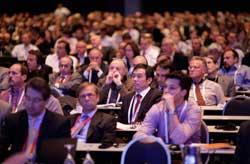
April 19, 2010 – The Transcatheter Cardiovascular Therapeutics (TCT) 2010 scientific sessions set for September will provide significant clinical research updates to technologies and practices in interventional cardiology that will directly affect patient care.
The important role of interventional cardiology has figured prominently in recent current events with the announcement that former President Clinton received a heart stent in February at New York-Presbyterian Hospital. This was followed by the reporting of clinical trial data showing promising results for a heart valve repair device that is inserted via a catheter.
At TCT 2010 (Sept. 21-25 in Washington, D.C.), late-breaking data from clinical trials on the next generation of stents, valve repair and replacement, and the interactions and effectiveness of new medicines will shed light on the best ways to treat patients.
“Catheter-based valve repair and replacement, novel stents, and the effectiveness of various drugs used to treat heart disease are going to be among the major topics at TCT this year,” said Gregg W. Stone, M.D., professor of medicine at Columbia University College of Physicians and Surgeons, director of cardiovascular research and education at the Center for Interventional Vascular Therapy at NewYork-Presbyterian Hospital/Columbia University Medical Center, and co-director of the medical research and education division at the Cardiovascular Research Foundation. TCT is organized by the Cardiovascular Research Foundation.
“Nonsurgical aortic valve replacement has the potential to be life saving for people who are at high risk for open heart surgery,” Dr. Stone said. “As the population ages, this technique may dramatically benefit the quality of life for patients whose aortic valves (the valve through which blood passes from the heart to the rest of the body) fail to function properly. We are hopeful that new trial data that will be presented at TCT will usher in the field of nonoperative aortic valve replacement.”
This year, TCT will also provide a new program, “TCT in 3,” designed specifically for the busy interventional practitioner. It features a concentrated curriculum in a shorter three-day time frame from Thursday, Sept. 23 through Saturday, Sept. 25. Highlights include live cases, late breaking trials and practice management sessions.
The conference will feature specific tracks for cardiac surgeons and nurses and technologists. The Surgeons course will provide instruction on percutaneous valve repair, hybrid (joint) surgical and interventional approaches to heart disease, percutaneous aortic aneurysm repair methods, with an in-depth course on advanced surgical techniques. The 19th Annual Nurse and Technologist Symposium will detail new trends and cath lab procedures essential for the allied health care professional.
In 2009, TCT was held for the first time in San Francisco, where it attracted record numbers of attendees. About 99.4 percent of physician attendees surveyed stated TCT increased their knowledge to improve their practice.
For more information: www.tctconference.com


 November 14, 2025
November 14, 2025 









